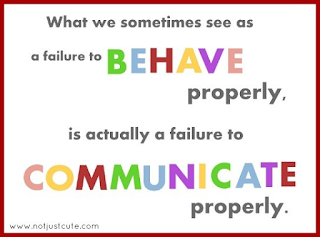This past week I have been preparing a Family Resource plan for my case study family in my Family and Community Relationships class. I have studied and researched different types of resources to help this family know how to help their child with a disability. I have found community, private, national, state, and federal resources. I have learned through this project and by listening to my classmates project, that every family is different which means that they will need different types of resources. I have also learned that since each family is unique with different backgrounds and cultures. Because of this it is important to make sure that the family will not be offended by the resources that have been provided to them. I have also learned that before finding a resource for a family it is important to really get to know the family and their needs. You don't want to find a resource and tell the family about it and have the family tell you that what you found for them is not what they need. Since I got to create my case study family, I was able to know the family very well so all the resources that were found for them, fit their family needs and concerns perfectly.
Here are some links to two articles and one video about how The Church of Jesus Christ of Latter-day Saints supports families and communities, specifically focusing on helping families who are taking care of family members who have a disability.
Articles:
Video:
As I studied these articles and watched the video, one key takeaway that I got was that the best way to support a family with a family member who has a disability, is to just be their friend. Everyone can use another friend especially those individuals who have a disability. Other takeaways was to focus on what individuals with disabilities can do rather than focusing on what they may be unable or struggle doing. A motto of mine is to always look for the positive in every individual and situation. This quote from Elder Uchtdorf sums everything up perfectly, "God does not look on the outward appearance. I believe that He doesn't care one bit if we live in a castle or a cottage, if we are handsome or homely, if we are famous or forgotten...We are important to God...He loves every one of us, even those who are flawed, rejected, awkward, sorrowful, or broken" (Dieter F. Uchtdorf, "The Love of God," Ensign or Liahona, Nov. 2009, 22-23). God is our greatest support and cheerleader.
Higher Wider Deeper Project Update
What do Registered Behavior Technicians do?
A sample job description would include being able to work in clinical settings, providing instruction in behavioral protocols, providing behavioral interventions at home, in the community, and at school. Use ABA (Applied Behavior Analysis) techniques and interventions to teach communication, social, daily living skills, and to reduce problematic behaviors and replace with more appropriate behaviors in all settings. The RBT will be under the direct supervision of the applied behavior analyst supervisor in all interventions and data collection trials.
What are some needed skills and abilities? These are not all the needed skills and abilities but they are some of the most important that I found that I thought were important. To view more skills and abilities, follow the links below.
- Time management skills.
- Manage multiple tasks at once.
- Excellent written and verbal communication skills.
- Ability to develop and maintain relationships with clients, supervisors, peers, and community members.
- Maintain client confidentiality and adheres to HIPPA laws.
- Must maintain a professional appearance.
- Must be able to sit or stand for long periods of time.
- Must be able to lift up to 50 lbs. and lift and carry clients with adaptive equipment.
- Provide direct student instruction and assist staff with implementation.
- Perform other tasks as assigned.
Sources:
- https://www.appliedbehavioranalysisedu.org/registered-behavior-technician/
- https://www.coe.uh.edu/quest_opp/display.cfm?filename=lily-center.pdf
- https://www.psdschools.org/sites/default/files/PSD/human_resources/Job%20Descriptions/Job%20Descriptions%20Teacher/Job%20Descriptions%20CN/Job%20Descriptions%20Custodial/Job%20Descriptions%20Instruct%20Support/Registered%20Behavioral%20Technician%20-%2041635.pdf








